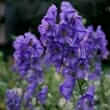Background
- The word Aconitum comes from the word "akone," meaning "rocky," which is the type of area where the aconite plant grows. Cured aconite preparations have a long history of use in Chinese medicine. Processed aconite was used to treat heart failure and other heart diseases. However, aconite has been repeatedly associated with cardiovascular (heart) adverse events. For this reason, the German Commission E does not recommend its use.
- Aconite is well known for its extreme toxicity. The tuberous root is used in traditional medicine, although all parts of the plant are considered to be toxic. Aconite also has a near worldwide historical usage as an arrow poison and as a poison in executions, homicides, and suicides. Aconite is also said to be an ingredient of "flying ointments" used by witches to imitate the sensation of flying.
- Aconite has been used in very low doses to treat neuralgia (nerve pain), sciatica, and rheumatism. Aconite is also an ingredient in homeopathic preparations used for cold and flu symptoms, heart palpitations with anxiety, acute inflammatory illness, and peripheral nerve pain. Overall, the efficacy has not been established.
References
Natural Standard developed the above evidence-based information based on a thorough systematic review of the available scientific articles. For comprehensive information about alternative and complementary therapies on the professional level, go to . Selected references are listed below.
- Alibeu JP, Jobert J. [Aconite in homeopathic relief of post-operative pain and agitation in children]. Pediatrie 1990;45(7-8):465-466.
View Abstract - Bao YX, Yu GR, Xu JM, et al. Effect of acute higenamine administration on bradyarrhythmias and HIS bundle. A clinical study of 14 cases and animal experiment on dogs. Chin Med J (Engl.) 1982;95(10):781-784.
View Abstract - Ernst E. Cardiovascular adverse effects of herbal medicines: a systematic review of the recent literature. Can J Cardiol 2003;19(7):818-827.
View Abstract - Imazio M, Belli R, Pomari F, Cecchi E, et al. Malignant ventricular arrhythmias due to Aconitum napellus seeds. Circulation 12-5-2000;102(23):2907-2908.
View Abstract - Lin CC, Chan TY, Deng JF. Clinical features and management of herb-induced aconitine poisoning. Ann Emerg Med 2004;43(5):574-579.
View Abstract - Lowe L, Matteucci MJ, Schneir AB. Herbal aconite tea and refractory ventricular tachycardia. N Engl J Med 10-6-2005;353(14):1532.
View Abstract - Oberbaum M, Schreiber R, Rosenthal, C, et al. Homeopathic treatment in emergency medicine: a case series. Homeopathy 2003;92(1):44-47.
View Abstract - Smith SW, Shah RR, Hunt JL, et al. Bidirectional ventricular tachycardia resulting from herbal aconite poisoning. Ann Emerg Med 2005;45(1):100-101.
View Abstract - Tai YT, But PP, Young K, et al. Cardiotoxicity after accidental herb-induced aconite poisoning. Lancet 11-21-1992;340(8830):1254-1256.
View Abstract







